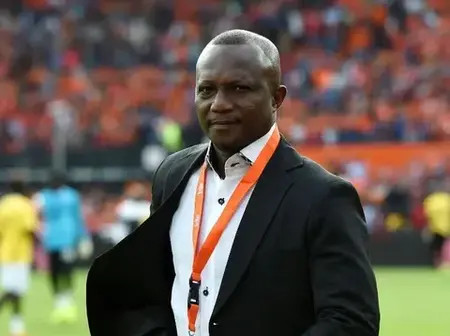Sudan are potentially 180 minutes away from clinching the CHAN 2024 trophy despite being in the midst of a war, and Kwesi Appiah is key to that.
Ghanaian coach James Kwesi Appiah has written many chapters in African football, but few are as dramatic as the one unfolding with Sudan as they prepare for the semi-finals of the 2024 African Nations Championship (CHAN) against Madagascar on Tuesday.
Against the backdrop of a brutal civil war that has displaced more than 12 million people and left entire cities in ruins, the 64-year-old has turned Sudan’s national teams into one of the continent’s most compelling stories.
Appiah’s Sudan are not only semi-finalists at the CHAN tournament, but they have also qualified for the 2025 Africa Cup of Nations in Morocco, notably ahead of his home country, Ghana. Furthermore, the Falcons of Jediane sit just one point behind leaders DR Congo in their 2026 FIFA World Cup qualifying group, which includes continental giants Senegal.
PAY ATTENTION: Stay updated with the Latest Sports News in Kenya from Pulse Sports
For a nation whose domestic league is suspended, whose players are effectively nomads, and whose home fixtures are staged in Libya or South Sudan, their achievements border on the miraculous.
This is not the first time Appiah has turned adversity into triumph. As a player, he was part of Ghana’s 1982 Africa Cup of Nations winning squad in Libya, which secured the Black Stars’ fourth continental title. As a coach, he became the first black African to lead Ghana to a FIFA World Cup, steering them to the 2014 tournament in Brazil.
Despite these past successes, Appiah is focused on achieving more with his current team. “Once you are in a tournament, you must aim for the trophy,” Appiah told CAFOnline.com. “I don’t believe in participating just to add numbers. If you enter, you must go all out to win.”
That winning mentality has travelled with him from Accra to Khartoum—and now to Sudan’s temporary bases in Saudi Arabia, Mauritania, and Libya.
The war that erupted in April 2023 forced the suspension of Sudan’s domestic league. Its top clubs, Al Hilal and Al Merrikh, were temporarily absorbed into the Mauritanian league just to keep their players active. Many squad members have lost family to the conflict, while others are separated from loved ones scattered across refugee camps in Chad and South Sudan.
“Most of the time, we receive messages that one of the boys has lost a relative,” Appiah said. “But I always remind them: you are the ones who can bring smiles to your people. Even when the fighting continues, when we play, sometimes the guns go silent for a week or two.”
The symbolism is powerful: football has become a fragile sanctuary in the midst of war. For Sudanese everywhere, this team is a source of unity.
In a poignant twist, Appiah’s Sudan eliminated his own country, Ghana, from the AFCON 2025 qualifiers. A goalless draw in Accra was followed by a stunning 2-0 victory in Benghazi, sealing Ghana’s first failure to reach the Nations Cup in 20 years.
“As a Ghanaian, of course I was sad,” Appiah admitted. “But once you are a professional, you look at where you are working. My responsibility is Sudan.”
The CHAN semi-final run only underlines their resilience. Against Algeria, last edition’s runners-up, Sudan fought to a 1-1 draw before winning Saturday’s quarter-final 4-2 on penalties, with goalkeeper Mohamed Abooja emerging as the hero. Now, they stand just one game away from their first-ever CHAN final.
Appiah’s methods extend beyond tactics. “I tell the players to feel like they are Messi or Ronaldo,” he explained. “They should never belittle themselves. Wherever we play, whether we have supporters or not, we must see it as home.”
His emphasis on psychology has transformed players like Abdelrazig Omer, Mohamed ‘Abooja’ Saeed, and Ramadan Agab into leaders. With training camps in Saudi Arabia providing modern facilities and exposure, the Falcons are fitter, more tactically astute, and mentally tougher than ever before.
For Appiah, this journey is about more than results. “Maybe through football, the war might even come to an end,” he told BBC Sport Africa. That may sound idealistic, but the evidence is visible: Sudanese fans from rival clubs Al Hilal and Al Merrikh have set aside decades of hostility to unite behind the national team.
“Football is one of the keys that can unlock such wars,” Appiah insists. His success has already sparked a continent-wide debate about trusting local coaches, with many pointing to him as proof that African managers can deliver even in the harshest conditions.
Sudan now prepares to face Madagascar in the CHAN semi-finals. Later this year, they will compete at AFCON 2025 in Morocco, and they remain in contention for a spot at the 2026 World Cup—a stage Sudan has never reached.
Whatever happens next, Kwesi Appiah has already etched his name into African football folklore. From AFCON champion in 1982 to World Cup coach in 2014 and miracle worker in 2024, his legacy is secure.

Leave a Reply